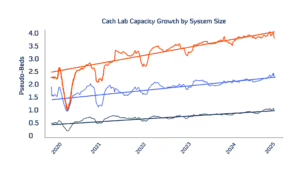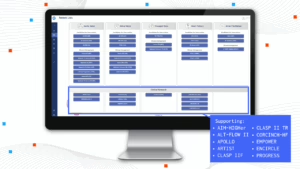BACKGROUND
Progression from moderate to severe aortic stenosis (AS) warrants careful monitoring due to the increased risk of sudden death and heart failure, with disease progression significantly varying among patients and no accurate predictive tools presently available.
OBJECTIVE
A Disease Progression Algorithm was developed from a deidentified database of 1,163,923 echocardiographic (echo) reports from 35 US institutions (egnite Database; egnite, Inc., Aliso Viejo, CA, USA) to predict the likelihood that a patient with moderate AS has progressed to severe AS over a 1- and 2-year period.
METHODS
Echocardiographic reports meeting inclusion criteria were ordered by patient and split into training (N = 4,499 patients) and test (N = 1,886 patients) datasets. Natural language processing and statistical modeling were used to support echocardiographic report evaluation and algorithm training, respectively. Algorithm development utilized a Cox proportional hazards model based on aortic valve (AV) measurements (AV area [AVA], jet velocity [JV], and mean pressure gradient [MPG]), age at date of index echocardiographic report, and time since moderate AS diagnosis to generate a predicted progression index (estimating the likelihood of a severe AS diagnosis upon reexamination with echo). Validation analyses compared population progression indexes to estimated actual observed disease progression towards severe AS within the test dataset.
RESULTS
Algorithm predictions approximated that 17.2% and 41.3% of the population would progress to severe AS at years 1 and 2, respectively, with the estimated actual observed progression of 15.8% and 42.0% at years 1 and 2, respectively. Progression for subpopulations stratified by initial AV measurements (AVA, JV, MPG) were predicted with an average error of 2.3% points.
CONCLUSIONS
Overall, the Disease Progression Algorithm represents a useful clinical tool that can accurately predict the progression from moderate to severe AS, identify subpopulations of patients who were more likely to progress to severe AS, and help physicians identify/prioritize patients who require careful follow-up after the diagnosis of moderate AS, potentially closer than recommended guidelines.
Moualla SK, McCarthy PM, Thomas JD, Dobbles M, Petrescu OM, Loper T, Barnhart GR, Brennan JM. Artificial intelligence-enabled predictive model of progression from moderate to severe aortic stenosis. Intelligence-Based Medicine. 2022;6:100062. doi: 10.1016/j.ibmed.2022.100062



